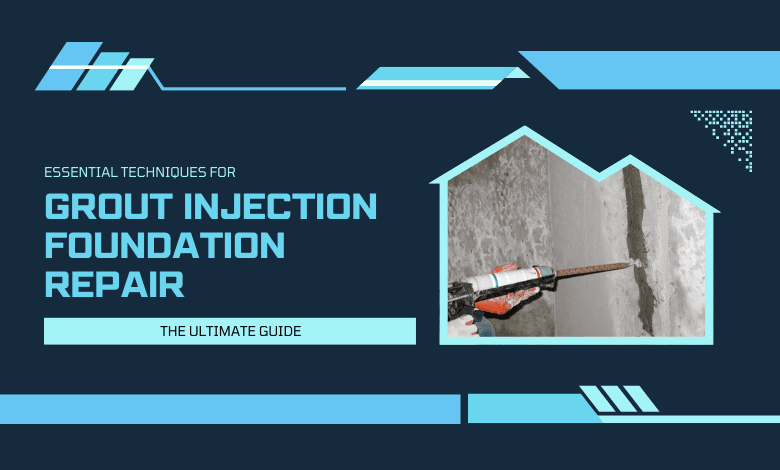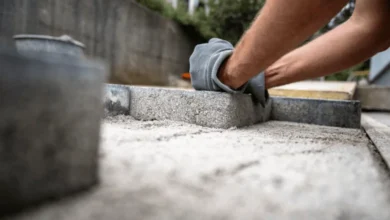Essential Techniques for Grout Injection Foundation Repair: The Ultimate Guide

Understanding the Basics of Grout Injection
What is Grout Injection and How Does It Work?
Grout injection is a celebrated method used in foundation repair, primarily focused on stabilizing the soil beneath a structure and filling voids caused by erosion or settlement. This method consists of injecting a mixture of water, cement, and other additives deep into the soil, creating a solid matrix that supports the foundation above. The process begins with strategically drilled holes at various depths surrounding the affected area. Once these holes are prepared, a specially formulated grout is injected at high pressure, allowing it to spread through the soil, filling any voids and binding the existing soil particles together. This method is not only effective but also minimally invasive, which is one of its paramount advantages in foundation repair.
The Importance of Soil Stabilization beneath Your Foundation
The soil beneath a foundation serves as the primary support system for any structure. Over time, factors such as excessive rainfall, fluctuations in temperature, or even alterations in underground water levels can lead to soil erosion or the creation of voids. Without intervention, these issues can result in significant foundation problems such as cracking, settling, and even total failure in extreme cases. Soil stabilization is crucial as it reinforces the ground beneath a foundation, reducing movement and displacement. Grouting not only fortifies the soil but also enhances load-bearing capabilities, ensuring the longevity and stability of your home or commercial property. This preventative measure can save homeowners from costly repairs in the future while providing peace of mind.
Common Signs of Foundation Issues That Call for Grout Injection
Recognizing signs of foundation issues early can make a critical difference in the management of your property. Homeowners may notice cracks in the walls, uneven floors, or doors and windows that stick or fail to open smoothly. These symptoms indicate that the foundation may be shifting or settling beyond acceptable limits. Additionally, gaps between the walls or ceilings and noticeable settling or sinking of the foundation are alarming indicators that grout injection should be considered to remedy underlying soil issues. It’s essential to conduct regular inspections and, when in doubt, consult a professional to assess your foundation’s integrity. Timely intervention can prevent progressive damage and preserve the structure’s overall safety.
The Grout Injection Process: Step by Step
Preparation: Assessing Your Foundation’s Needs
The first phase in grout injection foundation repair is thorough assessment and preparation. A structural engineer or foundation repair specialist will examine your property to identify the nature and extent of the problem. This assessment often includes a visual inspection of foundation cracks, slopes in the floor, and signs of moisture intrusion. Ground-penetrating radar may be utilized to identify additional issues beneath the surface that are not immediately visible. Based on these findings, a suitable repair strategy will be formulated, which may encompass soil testing to determine the soil type and composition for effective grout selection. This preparatory stage is critical; accurate diagnostics set the foundation for a successful repair and ensure that the correct methods are used.
The Injection Method: Techniques and Technology Explained
Once the preparatory phase is complete, the chosen grout injection method can commence. The actual injection process may vary based on several factors, including the type of soil, the severity of the foundation issues, and whether the project involves residential or commercial properties. The most common techniques include the use of high-pressure injection pumps that deliver the grout at a calculated pace and pressure, allowing it to permeate effectively into the compromised soil. Alternatively, low-pressure injection may be employed for lighter applications where minimal disturbance is required. Recent advancements in technology have introduced the use of expanding polyurethane grouts that react with moisture in the soil, expanding to fill voids and binding soil particles together while allowing for a lightweight solution, which limits additional burden on the existing foundation. Additionally, monitoring and control systems during the application can track how and where the grout spreads, ensuring thorough coverage and efficacy.
Post-Repair Care: Ensuring Longevity of Your Foundation
Once grout injection is completed, proper care and monitoring is essential to maintain the integrity of the repair. The first recommended post-repair action is to limit heavy activities in and around the repaired foundation area for a few weeks to allow the grout to cure appropriately. Additionally, homeowners should keep a close eye on the property for any warning signs of future issues such as the re-emergence of cracks, shifting soil, or moisture issues. Regular inspections and minor maintenance tasks can foster ongoing foundation health, while addressing concerns early can help to mitigate larger, more complex problems that may arise later.
Choosing the Right Grout: Materials Matter!
Types of Grout Used in Injection: Pros and Cons
Choosing the right type of grout for injection is crucial, as it has direct implications on the success of the foundation repair. Common options include cement-based grouts, epoxy grouts, and polyurethane grouts, each with its own set of advantages and disadvantages. Cement-based grouts are widely used due to their affordability and strength; however, they may shrink over time, leading to potential voids if not adequately monitored. Epoxy grouts offer superior bonding capabilities and are ideal for high-performance applications but can be significantly costlier than other options. Polyurethane grouts are often favored for their quick-setting nature and flexibility, allowing them to adapt to minor soil movements, though they may not provide the same high strength as cement or epoxy-based alternatives. Ultimately, the selection depends on various factors, including soil conditions, load requirements, and budget considerations.
How to Select the Right Grout Based on Soil Type
Soil type plays a pivotal role in determining the appropriate grout for injection. Different soil properties, such as granularity, cohesion, and moisture content can impact how the grout behaves once it is injected. For instance, sandy soils, known for their high permeability, may require a low-viscosity, quick-setting grout to fill voids effectively. Conversely, clay soils, which can retain water and swell or shrink based on moisture levels, might benefit from a flexible grout that can expand and contract without cracking. Consulting with a geotechnical engineer can provide invaluable insights into the soil characteristics of your property, guiding the selection of the right grout mix that promises optimal results.
Innovative Mixtures: What’s New in Grout Technology?
In recent years, advancements in grout technology have given rise to innovative mixtures designed to enhance performance and efficacy. Some new grout formulas incorporate additives such as fibers to bolster structural integrity or polymers for improved flexibility and bonding. Biopolymer grouts have also gained traction, as they are derived from renewable sources and can achieve substantial stabilization with minimal environmental impact. Additionally, the development of smart grouts that can respond to environmental changes like temperature and moisture fluctuations is on the rise, allowing for dynamic adjustments to better support a foundation over time. Keeping up with these trends can ensure that you’re utilizing the most effective materials available for your foundation repair needs.
Cost and Benefits of Grout Injection Repair
Financial Considerations: Is Grout Injection Worth It?
The cost of grout injection foundation repair can vary significantly based on several elements, including the extent of the damage, the type of grout selected, and the geographical location. On average, homeowners can expect to spend anywhere from $1,000 to $3,000 for minor repairs, while more extensive remediation efforts could reach upwards of $10,000 or more. Despite the cost considerations, grout injection is often seen as a worthy investment, especially when compared to the potential financial ramifications of neglecting foundation issues. Escalating repair costs, diminished property value, and decreased living comfort combined can make grout injection a financially prudent choice to ensure the stability and longevity of your home.
Comparing Grout Injection to Other Foundation Repair Methods
When contemplating foundation repair options, it is vital to weigh grout injection against other common methods such as underpinning, piering, or traditional excavation. While underpinning provides a long-lasting solution, it often involves more invasive procedures that can lead to extensive landscape damage. Piering is another viable option, but can be significantly more expensive and time-consuming. In contrast, grout injection offers a less invasive and quicker solution, with the potential for immediate stabilization without lengthy disruption to your property. Evaluating these methodologies against your specific needs, time constraints, and budget can help determine the most suitable foundation repair method.
Long-term Benefits: Enhancing Property Value and Stability
Investing in grout injection foundation repair not only addresses immediate structural issues but also translates to long-term benefits that enhance your property’s overall value and stability. A solid foundation contributes fundamentally to the integrity of your home, positively impacting resale value and market attractiveness. Potential homebuyers are often wary of properties with notable foundation problems; thus, taking proactive steps can set your home apart in a competitive real estate market. Moreover, stable foundations reduce the risk of future repairs or safety hazards, promoting a sense of security and comfort for the homeowners. Thus, opting for expert grout injection repair offers enduring advantages that far exceed the initial costs involved.
Check out for more insightful articles that will leave you informed and inspired.






